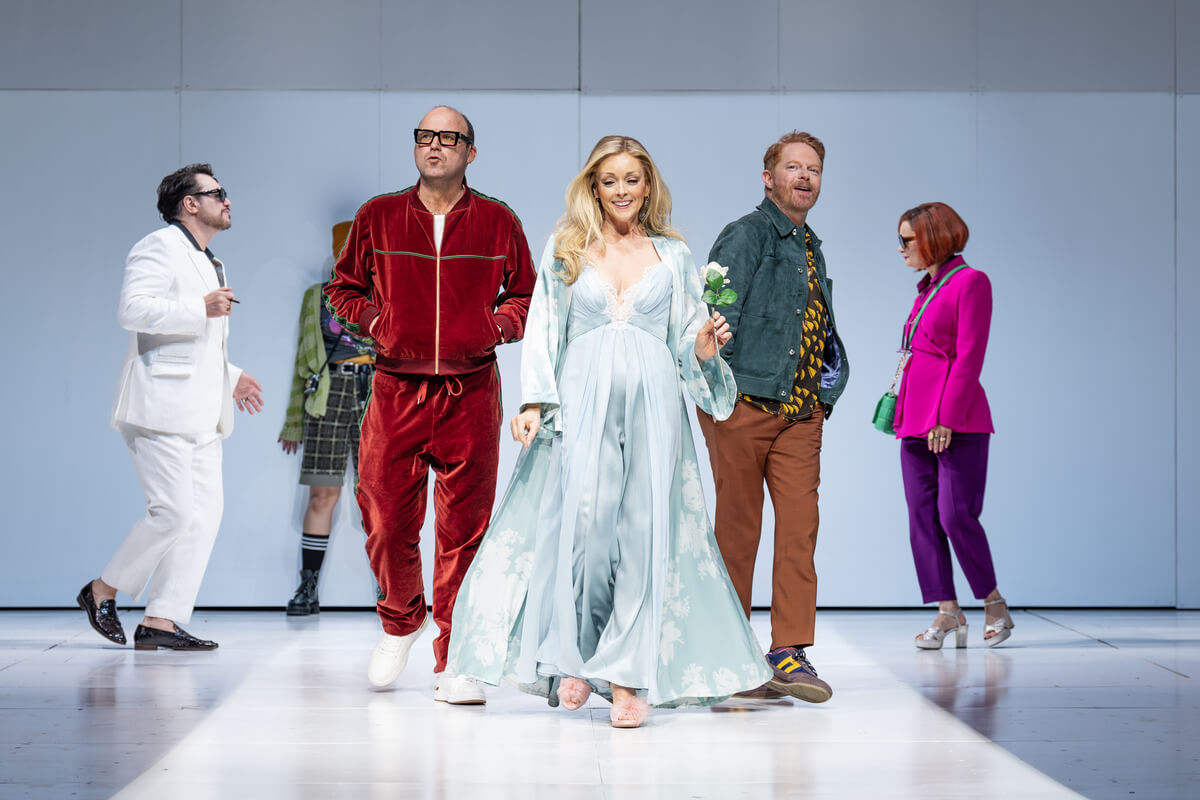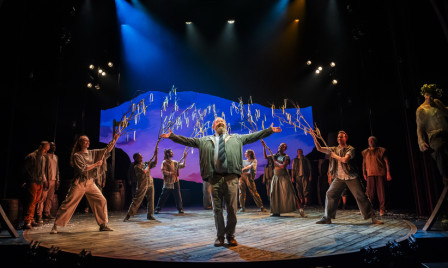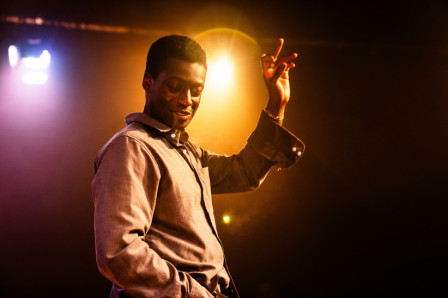Review: HERE WE ARE at National Theatre
With a book by David Ives, music and lyrics by the late great Stephen Sondheim, HERE WE ARE is apparently inspired by the films of Luis Buñuel, (presumably the goings on in The Discrete Charm of the Bourgeoisie and Exterminating Angel). This week, the show completed its transatlantic migration and landed at National Theatre’s Lyttelton stage.
 The cast of Here We Are at the National Theatre. Photographer Marc Brenner
The cast of Here We Are at the National Theatre. Photographer Marc Brenner
Directed by Joe Mantello with some busy choreography by Sam Pinkleton the show is a tricksy beast to categorise. Certainly it sounds very Sondheim with syncopated refrains reminiscent of Into the Woods, here and there are snippets of Sweeney Todd and there are smatterings of the madcap zaniness which runs through Anyone Can Whistle. What it lacks however, is the cohesion, romance and mellifluous fluidity of Sunday in the Park with George or A Little Night Music’s stunningly beautiful and complex harmonies. So what are we left with? Certainly not the in-depth characterisations in Company or the searing pathos of Follies. So again, what are we left with? Seriously, I’m asking. In truth, I suspect the desperately sad answer, is a semi-Surrealist muddle, and not even a European or remotely Spanish one!
At a wealthy home, visitors have arrived for a Saturday brunch. No-one seems prepared and the house staff seem unwilling. So begins the search to find a venue for food. Cafe Everything offers exactly that, at least within its yellow pages thick menus, but nought is actually available (we don’t learn why). The distraught waiter feels the depth of his personal failure and we hear a gunshot off stage. We move on to a French bistro where our troupe of hungry clients discover the chef’s body is laid-out in one of the private dining rooms (we don’t learn why). The Piaf-esque waitress, clambers atop him in a show of remorse and homage, but as for clarity, this episode is less of a consommé and more of a stroganoff. We learn there is a social revolution, indeed one of the party is a young revolutionary determined to change the world (we don’t learn how, but there are references to the moral bankruptcy of the capitalist system).
Once the group abandon their search for a restaurant and convene at the Mirandan ambassador’s residence (who it transpires is also instrumental to maintaining the cocaine supply network through diplomatic pouches), they all become fearful to leave, instead hunkering down to spend a night together, which turns into days, which roll into each other (we don’t learn how many or how long).
The largely stylised and more successful first half, gives way after the interval to something of a confused mystery. There’s a great deal of disconnected silliness including the arrival of a bishop looking for a new career challenge, and agitated US Army personnel. But there’s a dearth of songs to indicate why there may have been a disintegration of society as we know it. The main issue, is that by this time, there’s no-one we actually give a damn about and the satirical narrative, such as it was, has unraveled.
The onstage talents (of which there are many) do their very best to convince us we are all having a good time and that HERE WE ARE is a blast, but in truth, this effort will irritate Sondheim aficionados and likely alienate those who are yet unfamiliar with the master’s superlative contribution to musical theatre.
Main Cast:
Tracie Bennett — Woman (brilliantly funny but under-utilised maid/waitress)
Chumisa Dornford-May — Fritz
Jesse Tyler Ferguson — Paul Zimmer (milestone plastic surgeon)
Richard Fleeshman — Soldier
Harry Haddon-Paton — Bishop (in need of a new challenge)
Cameron Johnson — Colonel Martin
Rory Kinnear — Leo Brink (unscrupulous businessman)
Jane Krakowski — Marianne Brink (an endearingly forgetful dimbo bimbo)
Denis O’Hare — Man (hilariously deadpan, particularly in the campy waiter/enabler roles) Martha Plimpton — Claudia Bursik-Zimmer (phone obsessed ball-breaker)
Paulo Szot — Raffael Santello Di Santicci (womanising ambassador)
Latest News

 Cast and London premiere announced for WORLD'S GREATEST LOVER
10 February 2026 at 13:54
Cast and London premiere announced for WORLD'S GREATEST LOVER
10 February 2026 at 13:54

 Full cast announced for SEA WITCH at Theatre Royal Drury Lane
10 February 2026 at 10:49
Full cast announced for SEA WITCH at Theatre Royal Drury Lane
10 February 2026 at 10:49

 THE UNLIKELY PILGRIMAGE OF HAROLD FRY at Theatre Royal Haymarket - Production images released
10 February 2026 at 10:30
THE UNLIKELY PILGRIMAGE OF HAROLD FRY at Theatre Royal Haymarket - Production images released
10 February 2026 at 10:30

 Review: MILES at Southwark Playhouse (Borough)
10 February 2026 at 10:10
Review: MILES at Southwark Playhouse (Borough)
10 February 2026 at 10:10